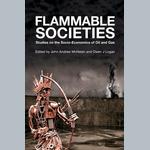Flammable societies?
Since the 19th century, the discovery and exploitation of hydrocarbon fuels transformed capitalist expansion and opened a new world of possibilities for a large number of countries worldwide. However, only a few countries has been able to turn the potential wealth in their land and seas into a democratic and egalitarian society. After four decades of oil and gas extraction, it is painstakingly clear that abundance of hydro-carbon resources does not guarantee flourishing economies and the eradication of poverty.
Flammable Societies highlights the importance of historical grievances, ideologies and social values in understanding the socio-economics of the oil and gas industry. Editors John-Andrew McNeish, affiliated senior researcher at the Chr. Michelsen Institute, and Owen Logan, research fellow at the University of Aberdeen, conclude that these aspects are missing from ongoing discussions taking place in academia, the media and politics.
Perverted truisms
According to John-Andrew McNeish, existing prescriptions for resource governance are tainted by prevailing truisms of global energy politics.
-These truisms refer to the assumptions that the only way to avoid a resource curse is by making sure that the right technology, institutions and economic model, i.e. market liberalism, are in place.
Through a series of ethnographic studies from a wide range of countries, the editors conclude that grievance is just as important as the economics of greed in driving competition over oil rents. As the book makes clear, there should be awareness that these factors are consciously avoided through an oil policy on the basis of ideology and the application of an oil knowledge vortex applied by “Big Oil” and its followers.
Social territorialism
The geo-politics of oil and gas goes beyond pure economy and rent seeking. It is also a question of belonging and of ascribing social, as well as material, value to land and resources. Historical grievances become important in the sense that they are linked to these social values. Different segments of the population may have different histories and territorial markers, i.e. dissimilar social territorialities.
For example, the indigenous people of the Amazon project social, material and cultural values and activities onto their physical environment. Oil companies operating in the area do not necessarily share their view of the territory’s intrinsic value, as they are primarily driven by economic motifs. The disparate relationships to the territory results in competing claims. Such contrasting claims are unavoidable, and may very well be a factor explaining environmental conflict.
-If resources are not only tied to financial value, but to social identity, there is even more to lose when competing claims are made, says McNeish.
So how should the territory and the natural resources be managed? Is there a formula for success?
Good fortune?
When it comes to the idea of natural resources being a curse, Norway is the exception that proves the rule. According to McNeish, Norway’s success depends partly on luck, previous experience of a concessionary model, national sovereignty over natural resources, an economic model that stressed moderation, and democratization of decision making, now in decline. The oil workers unions pushed their interests, whilst bureaucrats were protecting national interests. These are characteristics of the Norwegian oil adventure, but is there anything to learn from the Norwegian experience? The book answers this question positively, but the editors of “Flammable Societies” also question the claim that Norway represents an unproblematic “good practice” example.
-The experiences of countries like Norway cannot be directly transported to the South. The historical and social differences are too great. Nonetheless there are some valuable lessons that should perhaps be considered by both North and South, such as the role of economic moderation, democratic socialization of decision-making, that democratic contestation of resource use is not a bad thing (not all southern oil producers are mired in civil wars), and that resources have different histories and meanings to different populations.
Publications

Flammable societies. Studies on the socio-economics of oil and gas

The multiple forms of violence in post-war Guatemala
Projects

Contested Powers: Towards a Political Anthropology of Energy in Latin America

Poverty Reduction and Gender Justice in Contexts of Complex Legal Pluralism
